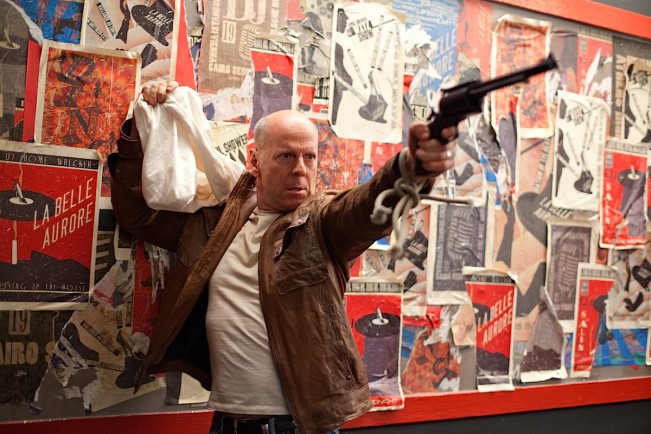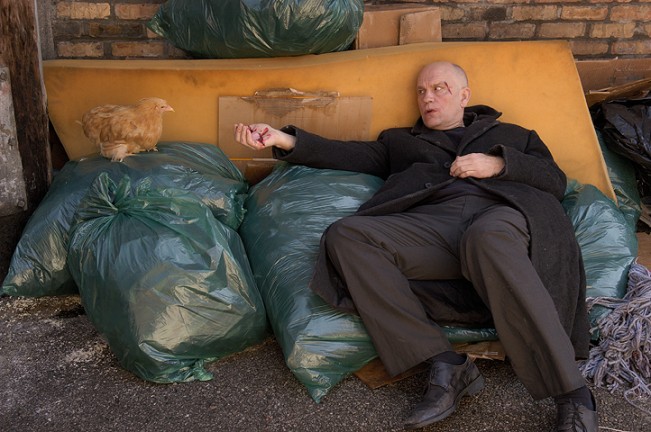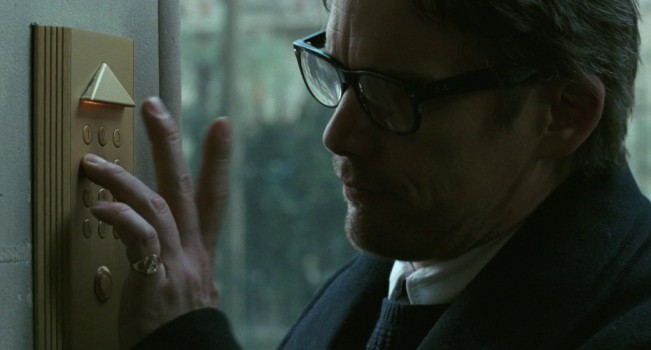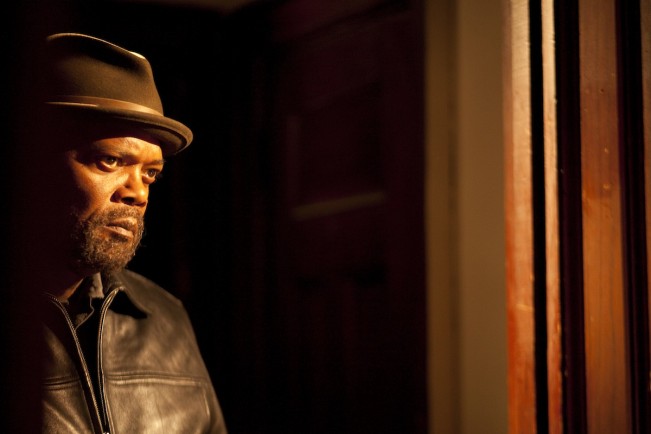

By Ray Pride Pride@moviecitynews.com
Pride’s Friday 5: Looper, Drunkboat, Woman In The Fifth, Damsels In Distress,The Samaritan
1. LOOPER. You might like this one.
2. DRUNKBOAT. This was a Sunday afternoon a long time ago, sometime near the end of the twentieth century. In years of theatergoing in Chicago and other cities, I’d seen some grand coups de theatre, but this one, this one that shaped itself beyond the actors’ pace, made an indelible mark. Outside, a sunny afternoon on the second floor above the Victory Gardens theater; inside, a variation on Fritz Lang’s M. Somewhere in the middle of the brief, striking piece, the sound of whistling rose from the Clark Street sidewalk a floor below. The character of The Detective stood at an open window, listening to the whistling, holding the pose, holding the scene, as a Howard Line train approached from the north, at first indiscernible, then discernible only for its familiarity, and finally the clack-clack-clack arrives equidistant to where we sat and The Detective slams the window down with a sudden violent gesture and the scene continues without commentary. The duration, the combination of the site-specific, moment-specific factors: simply wow. Bob Meyer was the director, and this was after the 1980s Gare St. Lazare Players productions on Armitage Avenue had made his name as a theatrical talent. His first feature film, Drunkboat, expanding upon a vignette produced in 1985, and shot in 2005 (with a copyright of 2010, which means it may be the version shown that year at the Chicago International Film Festival), cannot spend that memory, but it is a dismal husk. The film opens with an epigraph from Rimbaud’s “Drunken Boat”:
“But, truly, I have wept too much! The Dawns are heartbreaking.
Every moon is atrocious and every sun bitter:
Sharp love has swollen me up with heady languors.
O let my keel split! O let me sink to the bottom!”
And the film nearly does. Drunkboat is one of the rare, fine exemplars of a movie that, beyond its plot, in almost all formal particulars appears to be directed and produced by people who have never seen a movie. At all. In their long life. In Drunkboat, which Meyer has said is based on his own experience, teenage Abe (Jacob Zachar) enlists the help of his drunken uncle Mort (John Malkovich) to buy a boat from two conmen, played by John Goodman and the great and noble Jim Ortlieb, who appear to have drifted in, thinking they’re performing a genial turn on Beckett’s quizzical duos. Shot in Chicago but set in Detroit (according to a title superimposed over a shot of Ukrainian Village’s landmark 75-year-old Rainbo Club), the film opens on Malkovich’s terminal drunk with a deathly pallor, passed out with a filthy mop on his head, who then witnesses the beating of his nephew “Moo,” and it’s simple debasement. Malkovich’s drunken character is Drunkbore, emerging almost as a self-satire of the physical, bumptious, outburst-ridden style of acting that emerged from Steppenwolf’s early decades. The wiry mass of hair rising above his features is nearly as emphatic as the faces he pulls. If David Mamet had shit this out, he wouldn’t even have looked back before he flushed. The score is by Marc Ribot (credited as “Mark” Ribot). With Dana Delany, who ought to have had a fine film career alongside what she’s accomplished in television. (Virgil Films, video)
3. WOMAN IN THE FIFTH. The achingly melancholy The Woman in the Fifth, (La femme du 5e) Pawel Pawlikowski’s first feature in too many years—his last completed one, My Summer of Love, was released in 2004—follows an American novelist, Tom Ricks (Ethan Hawke) at loose ends in Paris: Tom is that fabled sort of writer who has written but can no longer write, despite the agreeable, well-meant praise of strangers. He comes to Paris with spoken goals that turn out to have deeper. Hawke’s severe features strain, his eyes well in worry, but he’s ideal as the observer who may be creating the very world around him, in increasingly ominous particulars. It’s a bold performance. Is he a character escaped from a Dostoevsky novel or a Dostoevsky seminar? Ambiguous, fraught, post-Polish paranoia of the Polanski manner encroaches, even as Tom meets a mysterious woman who could possibly supplant his fixations. Thriller meets chiller. Cinematographer Ryszard Lenczewski is key to the bursting gloom: as in his often dusky city landscapes in Margaret (2005/2011), Paris is a setting of burlap shadows and silken menace. Light falls and sometimes it crushes. And so much is about images of dimming, of diminishing, of flickering, such as one image of a wide tableau of interurban trains passing, and as they leave the frame, along the railway’s walls, fluorescent tubes sputter into nothing. They haven’t the energy to go on. Tom goes on. Eventually, he can even register surprise. Pawlikowski told the Telegraph’s David Gritten, “My stupid ambition is to make a film that’s not like any other–one that has its own kind of logic, and hooks viewers without making them think too much. It’s a film I’d love to see, one in which after 10 minutes the audience isn’t able to predict the whole thing.” Ambition accomplished. (New Video, video)
4. DAMSELS IN DISTRESS. Damsels in Distress may be one of the most charming and memorable movies I’ve ever seen that also plays as if the filmmaker had no experience whatsoever in making feature films. Whit Stillman has littered the pages of an eager press with his tales of his time in the wilderness, writing ambitious scripts for films that were never made, set thousands of miles from the home turf of Metropolitan (1990) and Last Days Of Disco, which began his public silence as a filmmaker in 1998. Expatriate days. Failed romances. His own biography-by-interviewer is more cleanly told anecdotage than Damsels. Plot strands flutter, in need of pruning, jokes that ought to be set up appear as if from nowhere, and slow fades to black end many scenes more by default than design. Yet its daffy, otherworldly story, rehearsing but not rehashing Stillman’s frankly reactionary instincts, resounds less for its charming gaggle of collegiate women than for its dramatization of self-deception and the despair of depression. Greta Gerwig’s Violet is at the center of a trio of women who want to bring elevated hygiene to an uncaring world. At the fictional Seven Oaks College, filmed largely on Staten Island, sidekicks Heather (yes, Heather, played by diminutive interrobang Carrie MacLemore) and Rose (Megalyn Echikunwoke) are augmented by a transfer floral scent, Lily (wide-eyed and too-cute-for-school Analeigh Tipton). Gerwig brings her customary panache with wafts of words to Stillman’s talk. On the surface, Violet is a snip and a snot. “The tendency, very widespread, to always seek someone ‘cooler’ than yourself—always a stretch, often a big stretch. Why not instead find someone who’s frankly inferior? It’s more rewarding and in fact quite reassuring.” Yet as the story progresses, Violet recedes, even disappears for a time, doubting herself, then transforming herself through an epiphany over soap from the “Motel 4” where she’d hidden way. There’s another synesthesic component with a male character, Thor, who claims never to have learned names of colors, and what begins as something dumb, dumber still in a digitally-shot film bursting with bold shades, hues and ladies’ finery, ends as an incredibly touching revelation involving a rainbow (seen above). (It’s a stunning instant, kapow and more.) Suddenly, the movie is more than Stillman’s verbal hues and cry. (Sony, video)
5. THE SAMARITAN. There are volumes yet to be written about characteristics in movies like “Canadian-ness” and “amateurishness” that would be well served to include a couple of the not-so-rare examples like The Samaritan in the proposal packet. Working for a second time with producer Andras Hamori (The 51st State), Samuel L. Jackson takes a hike to Hogtown as Foley, a conman-murderer who’s looking for a new beginning after twenty-five years in stir. Shot in an economical five weeks, co-writer-director David Weaver’s movie shares peculiarities of pacing and raggedness of tone that inhabit Canadian movies from low to high, and you have to ask at moments, is this just odd, piquant, or is it simply bad? The side streets and backstreets of Toronto have unexplored grit and color hardly glimpsed in U. S. movies having the city pass for an every-nowhere, and a neat neo-noir could be made there, if not for the eccentric feel. It’s not an otherness, strangeness, just… peculiar. The nudge-cum-punches of violence weirdly lack punch—inserts of unconvincing splatter after a mauling—and the overall pulp putrefaction lends itself to that kind of post-Tarantino effort best described as “Not Tarantino.” (And the kind of post-Soderbergh high-definition movies, very fond of deep pools of yellow, which could be called “Not Andres Serrano.”) Jackson has his moments, but not all of them seem to be from the same movie. Plus, he’s a man who witnesses a murder less than twenty-four hours after getting out of jail who can’t help but stay near the free-flowing whiskey, neat, and the spurts of red décor that lead all the way to hell. A flawed character would be better than an implausible ready mark. At least his leading man is granted a full-on erotic life. With the Can-Con-necessary Deborah Kara Unger and a lazy but pleasingly camp, cruel, vinous Tom Wilkinson. The simple, lovely score, far, far more restrained than the film, is by Todor Kobakov. (MPI Home Video.)


















